
Executive Education
- Why Executive Education?
- What is the reason for the popularity of Executive Education?
- What areas are taught at Executive Education?
- UWED pilot project with the Civil Service Development Agency, the Agency for Strategic Reforms, the Ministry of Investments and Foreign Trade of the Republic of Uzbekistan
- Program details
- Feedback from our members
- Our partners
- Faculty leadership
- List of upcoming study programs: Executive MBA / MPA
- Our contacts
Why Executive Education?
Executive Education has become a highly regarded and sought-after form of professional development for senior executives of public institutions, private companies, and nonprofit organizations. Its origins date back to the early 20th century, with the Massachusetts Institute of Technology (MIT) in the United States playing a pioneering role. In 1914, MIT launched the "Ideal Manager" program, designed for management engineers in large industrial companies. Shortly thereafter, Harvard University introduced a short-term MBA program aimed at executives. As demand for executive education grew, the field expanded throughout the 1980s and 1990s, developing into a well-established sector offering various programs and benefits.
According to Financial Times Executive Education Open 2021, , the top 90 business schools trained more than 350,000 executives from various industries and sectors in 2020.
What Drives the Popularity of Executive Education?
One of the key factors behind the popularity of Executive Education is its flexibility. Programs range from short-term courses to long-term diploma offerings, catering to senior executives at different levels. These programs are characterized by their high quality, drawing top professors and instructors, and incorporating case studies derived from the best international practices.
The distinctiveness of Executive Education lies in its participant base—students are often seasoned professionals who already have significant experience and have achieved success in their careers. The interactive nature of these programs fosters a collaborative learning environment, where participants not only gain theoretical and practical knowledge but also share their own experiences, expanding their professional networks across diverse industries and sectors.
As part of continuing education, Executive Education provides development opportunities for leaders at various stages of their careers. For some, it offers a chance to catch up on education they may have missed earlier in their careers. For others, it serves as a means to deepen and broaden specific areas of expertise in preparation for the next career advancement. In an increasingly fast-paced and dynamic world, Executive Education enables leaders to stay current and equipped with the knowledge needed to navigate emerging challenges. Consequently, it is not uncommon for even the most senior executives to participate in these programs alongside peers from different fields and industries.
What areas are taught at Executive Education?
Executive Education programs encompass a wide range of core disciplines within management, including finance, marketing, human resources, corporate governance, and project management. Additionally, specialized areas are offered, such as "Leadership and Strategy," "Leadership Development Programs," "Effective Teams," "Risk Management," "Effective Communication," "Capital Markets," "Digital Transformation," "Municipal Governance," and "Innovation Strategy," among others. The program formats vary, ranging from intensive 5-day courses to comprehensive one-year degree programs, such as Executive MBA, Executive MPA, and similar qualifications.
Faculty of Executive Education UWED
Based on the experience of leading universities in the world, the Faculty of Executive Education of UWED was opened as part of the initiative of the President of the Republic of Uzbekistan Sh.M. Mirziyoyev on a radical modernization of the system of retraining of the management of state institutions, top managers of government-owned companies and the private sectors. The main goal of the new faculty is to introduce the most advanced knowledge and international experience in the field of education for managers.
The activities of the new faculty include training managers and specialists in modern management and business methods, increasing competitiveness, familiarizing themselves with modern trends in global trade and investment activities, and experience in implementing the latest technologies in various sectors of the economy.
For the organization of training programs at the Faculty of Executive Education of the UWED, foreign professors and "know-how" belonging universities of the world are involved. The educational process takes place in the form of interactive seminars and conversations, based on examples (cases) from common practice, taking into account the conditions of Uzbekistan, which provides not only theoretical knowledge, but also practical skills based on common practice. Upon completion of training in the Executive Education programs, participants are issued official certificates of the international format.
UWED pilot project with the Civil Service Development Agency, the Agency for Strategic Reforms, the Ministry of Investments and Foreign Trade of the Republic of Uzbekistan.
As part of a collaborative pilot project with the Civil Service Development Agency, the Agency for Strategic Reforms, and the Ministry of Investments and Foreign Trade of the Republic of Uzbekistan, the University of World Economy and Diplomacy has facilitated a series of educational programs aimed at enhancing the leadership capabilities of high-level officials. These programs targeted heads of ministries and departments, municipal leaders, and senior executives from both state-owned and private enterprises across Uzbekistan. Notable programs included "Leadership and Strategy, Management Principles," "Attracting Foreign Investments: International Investment Law," "Organization of the Negotiation Process and Effective Negotiations," "International Communications," and "Contemporary Industrial Policies." These initiatives were conducted in collaboration with UWED professors and leading international institutions such as the University of Glasgow, University of Oxford (United Kingdom), ESSEC Business School (France), LUISS Business School (Italy), as well as experts from the BBC Corporation’s commercial representation.
Program details
“Managing Negotiations. Effective Negotiations”
This program was led by Alisher Fayzullaev, Doctor of Political Science, Candidate of Psychological Sciences, Professor, Ambassador Extraordinary and Plenipotentiary.
The program was designed to provide participants with both theoretical insights and practical skills necessary for effective negotiations. This encompassed setting clear goals, analyzing the positions of all parties involved, understanding the psychological dimensions of negotiations, developing strategies and tactics, and mastering complex negotiation techniques. Additionally, the course focused on the nuances of intercultural communication. The curriculum includes case studies from international practice, role-playing games, and interactive discussions, ensuring an engaging and practical learning experience.
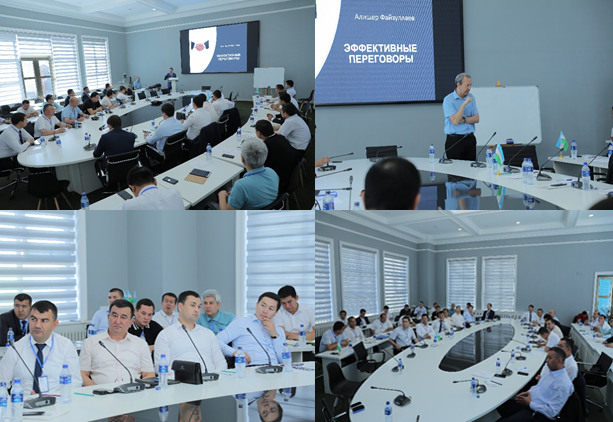
“Attracting Foreign Investments. International Investment Law”
The program was led by professors Christian J. Tams from the University of Glasgow, Antonios Tzanakopoulos from the University of Oxford, and N. Sirajiddinov, Professor at UWED.
In collaboration with these experts, a comprehensive training program was developed, targeting heads of cities and districts, as well as top executives of major public and private companies in Uzbekistan.The course delved into the critical role of foreign investments in economic development, current trends in global capital flows, and Uzbekistan’s policies in this area. Key topics included the structure and nature of international investment relations, the economic aspects of international investment law, sample investment agreements, and interaction between international investment law and national legislation. A key focus was on creating a conducive environment for foreign investment.
Participants engaged in detailed analysis of real-world cases, examining state interactions with foreign investors based on contemporary international practices.
At the conclusion of the program, H.E. Kim Hee-sang, the Ambassador of the Republic of Korea to Uzbekistan, shared valuable insights with participants, detailing his country’s practical experiences in attracting foreign investment and interacting with international investors.
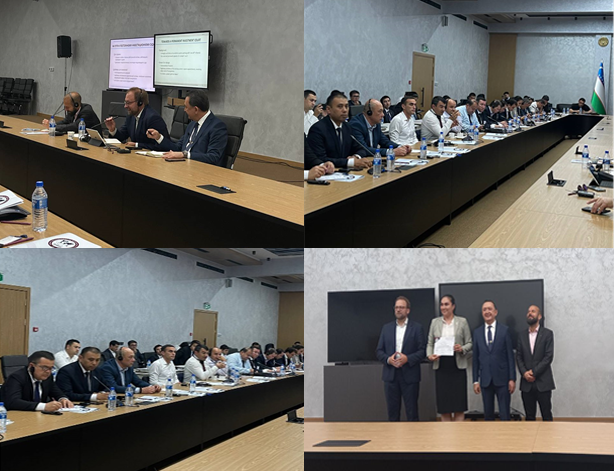
“International communications and country positioning in the world”
In the era of globalization, where information flows are constantly evolving and new communication formats and media platforms are emerging, the importance of establishing effective strategic and operational communications has never been more critical. The ability to implement a systematic approach to creating competitive and impactful content is now more relevant than ever.
An educational program titled "International Communications and Country Positioning in the World" was held in collaboration with the European Academy of News. Sergey Stanovkin, an internationally recognized media expert and Head of the Commercial Representation of the BBC Corporation, led the program.
The program brought together heads of PR and public relations departments, strategic planning, foreign economic relations, and international cooperation units from both state institutions and public/private companies in Uzbekistan. The program covered key topics such as organizing public relations systems, coordinating communication efforts, managing crisis communications, and delivering swift and effective responses to emerging events. It also addressed challenges like combating fake news, analyzing media platforms, content creation, building individual identities, connecting national and corporate brands, and creating specialized communication projects. Additionally, personal communication skills, learning from mistakes, and celebrating success stories were key areas of focus.
Throughout the program, participants explored successful global practices in international communications and information technology. They examined a wide array of communication tools, honed their information analysis abilities, and learned how to design effective communication campaigns. The course also emphasized adapting action plans based on the insights gained.
The educational process was structured around interactive seminars, using case studies from international best practices, with a focus on the experience of Uzbekistan.
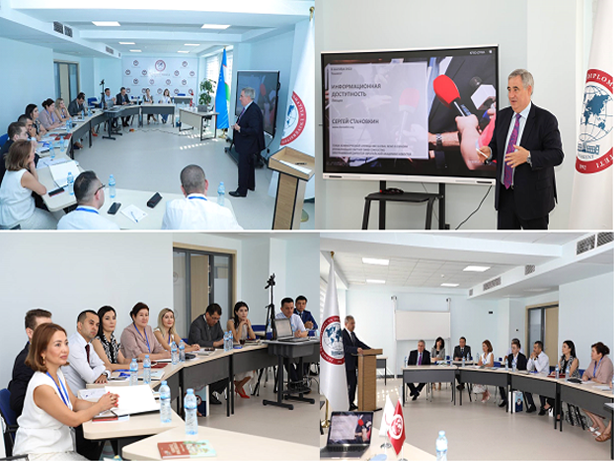
“Leadership and Strategy. Essentials of Managing”
In collaboration with the ESSEC Business School (France), an educational program "Leadership and Strategy. Essentials of Managing" was delivered. The classes were conducted by an internationally recognized expert in management and leadership, Professor of ESSEC Faculty of Management David Sluss.
The program was designed to enhance participants' individual management skills, with a focus on the psychological dynamics of interpersonal interactions, effective work organization, and the organizational transformation process.
The course included interactive practical exercises and discussions, using case studies from Harvard University, materials from the Harvard Business Review and the Academy of Management Journal, as well as practical exercises tailored to the working conditions in Uzbekistan.
Special attention was given to various management functions, building resilient teams, motivating employees, and achieving organizational goals. Participants were also tasked with preparing presentations that addressed real-world challenges based on their professional experiences.
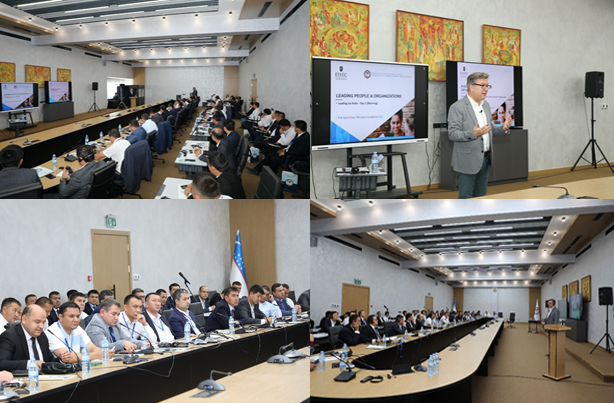
“Contemporary Industrial Policies”
The "Contemporary Industrial Policies" program was conducted in partnership with LUISS University Business School (Italy). The course was led by Matteo Giuliano Caroli, Professor at the Faculty of Economics and Director of the University's Center for Applied Research. The Center is widely recognized for its extensive corporate connections and innovative solutions in the field of industrial development. Professor Caroli is a distinguished expert in management, sustainable development, and competitive strategies, he has authored numerous articles in prestigious international publications.
The program attracted participants from various sectors, including senior executives from ministries and government agencies, industry associations, major joint-stock companies, as well as representatives from regional administrations (Khokimiyats) of Uzbekistan, particularly those involved with the industrial sector.
The course focused on enhancing participants’ ability to analyze the industrial sector from a macroeconomic perspective, with particular attention to regions and industries. It also covered strategies for improving competitiveness through optimization of natural advantages, fostering innovation, and developing action plans based on international best practices.
Throughout the program, both traditional and modern methods of industrial policy were examined. Topics included industrial planning, sustainable development strategies, risk management, and investment procedure improvements. The course content referenced the industrial policies of the European Union, Italy’s industrial recovery and resilience plan, as well as the industrial development models of countries such as Japan and Singapore. A significant portion of the program also featured case studies from Germany and Italy, which are Europe’s leading industrial producers. Dr. Tilo Klinner, the German Ambassador to Uzbekistan, provided valuable insights on Germany’s experience in developing innovative industrial clusters.
The training involved interactive practical exercises and discussions. Participants researched two major case studies and were tasked with preparing presentations on the development of specific regions and industries in Uzbekistan, drawing on the knowledge they acquired throughout the program.
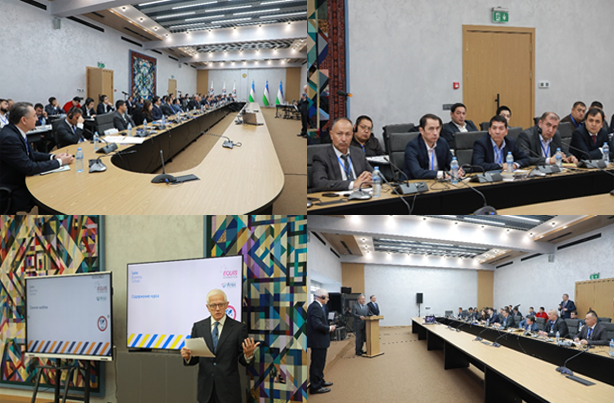
Feedback from our participants
Our training programs are attended by heads of ministries and departments, industry associations and large joint-stock companies, cities and regions of Uzbekistan, top managers of large public and private companies in Uzbekistan, heads of PR and public relations, strategic planning, foreign economic and international cooperation departments.
The study of students' assessments of the conducted programs shows a high level of interest and need for training executive personnel in the Executive Education format. Most of the participants note the significant benefits of the programs for improving their professional knowledge and skills, as well as for further career development. They will also highlight the high level of professors involved.
“Understanding international sanctions. Secondary sanctions. International arbitration. Challenges in practice”
An educational program "Understanding international sanctions. Secondary sanctions. International arbitration. Challenges in practice” was conducted jointly with professors from the Universities of Glasgow and Oxford.
The course is taught by Professor Christian J. Tams from University of Glasgow, Professor Antonios Tzanakopoulos and lecturer Eleni Methymaki from the University of Oxford. They are well known in the international academic and expert community, have extensive experience in conducting similar courses at leading universities and acted as consultants on international law for individual states and international organizations.
The program is designed to equip professionals with the tools to effectively navigate the challenges and opportunities posed by international sanctions regimes and arbitration. In particular, the program is intended to cover current sanctions regimes and regulations in different sectors and industries, with a focus on US, UK, and EU sanctions; secondary sanctions and their effects on business sectors; the limits of state jurisdiction and secondary sanctions; the current practice and case law in international sanctions and arbitration;
The course was attended by executives and professionals of legal departments of banks, major joint-stock companies and other organizations involved in the field of foreign economic activity.
“Public-Private Partnership (PPP): Successful Examples from International Practice”
Jointly with the consulting company AXELCIUM (France), was conducted an educational program “Public-Private Partnership (PPP): Successful Examples from International Practice” In 2019 The Government of Uzbekistan has initiated a large-scale public-private partnership (PPP) development program to accelerate the development of various sectors of the country's economy.International experience shows that successful implementation of PPP projects requires innovative approaches in preparation, design, implementation and management.
The course was conducted jointly with the consulting company AXELCIUM (France), specializing in the field of PPP and participating in the implementation of large-scale PPP projects in Uzbekistan. AXELCIUM has experience in implementing more than 130 PPP projects in 35 countries around the world.
The educational program was attended by heads and experts of ministries and departments of Uzbekistan involved in the implementation of PPP projects. The program was aimed at practical familiarization with the principles of public-private partnership and the practice of implementing successful PPP projects based on international best practices.
The educational process was conducted in the form of interactive seminars and discussions with the participation of international experts with examples (cases) from international practice in English with simultaneous translation.
“Strategy and Management of Transformation”
Jointly with the Senteo consulting company (USA), an educational program “Strategy and Transformation Management" was conducted.The program was developed jointly with Senteo to train senior executives of enterprises in Uzbekistan undergoing the transformation process within the framework of the state program for improving the mechanism of reforming enterprises and banks with the participation of the state.Senteo’s focus area is strategy and management, transformation of business models and development of corporate culture. It’s list of clients includes IBM, Renault, IKEA, Telefonica, Wembley, Vodafone, Barclays, UBS, Alfa Bank, BNP-Paribas, Citibank, Megafon, Georgian Ministry of Justice, etc.Classes are taught by Senteo CEO Michael Ruckman, who posesses many years of work experience in major international companies, and in management consulting. He regularly conducts similar educational programs at leading universities around the world.
The educational program was attended by executives and professionals of enterprises with a public share that are subject to reform aimed at increasing operational efficiency. The training is designed to equip participants with the tools to effectively navigate strategic and project management, development and evolution of business models, and implementation of successful transformation projects based on international best practices.
"Leadership and development of corporate culture”
Jointly with the Senteo consulting company (USA), an educational program "Leadership and development of corporate culture” was conducted.
This educational program is of particular relevance due to the fact that the Government of Uzbekistan is implementing a large-scale enterprise reform program with the participation of the state. The program introduced participants to the advanced practices of adopting corporate culture, leadership styles and the evolution of corporate culture management based on international best practices.
Senteo’s focus area is strategy and management, development of corporate culture and transformation of business models. It’s list of clients includes IBM, Renault, IKEA, Telefonica, Wembley, Vodafone, Barclays, UBS, Alfa Bank, BNP-Paribas, Citibank, Megafon, Georgian Ministry of Justice, etc.
Classes are taught by Senteo CEO Michael Ruckman, who posesses many years of work experience in major international companies, and in management consulting. He regularly conducts similar educational programs at leading universities around the world.
The educational program was attended by executives and professionals of enterprises with a public share that are subject to reform aimed at increasing operational efficiency. The training was aimed at developing students' systematic understanding of the driving forces and mechanisms of corporate culture, methods of designing and developing a corporate structure to achieve success and growth.
"Innovative business models in the digital age”
Jointly with the Senteo consulting company (USA), an educational program "Innovative business models in the digital age” was conducted.
The program introduced participants to the key aspects of digital transformation and the evolution of management based on international best practices and modern technologies. The educational program was attended by senior executives and professionals in marketing, sales, business development, product managers and data analytics.
Senteo specializes in strategy and management, corporate culture development, and the transformation of business models. Its client roster includes industry leaders such as IBM, Renault, IKEA, Telefonica, Wembley, Vodafone, Barclays, UBS, Alfa Bank, BNP Paribas, Citibank, Megafon, and the Georgian Ministry of Justice, among others.
The program was delivered by internationally recognized expertand Managing Partner of Senteo Alexey Veretenov.,. Alexey Veretenov is a prominent figure in the international academic and consulting communities, with extensive experience in executive education at leading universities worldwide. Healso provide consulting services to various organizations and corporations.
The training focused on developing participants' systemic understanding of how innovations drive changes in product functionality, enhance customer interaction channels, and create additional value for customers. The program offered comprehensive solutions for improving customer experience management, creating customer engagement applications, applying customer-oriented analytics, and utilizing data-driven decision-making.

Usmanov Bekhzod Boburovich - First Deputy Chairman of the Board for Transformation of JSC "Uzbekneftegaz"
“Program “Modern industrial policy”. I liked the theme and structure of the presented material. In particular, the lecture of the German Ambassador was very interesting in terms of the historical development of industrial clusters in Germany and their interaction with each other. The training program on the topic "Industrial Policy" is very relevant given the ongoing economic reforms both in the country and in large companies. The issues raised will allow managers to build strategic plans for the transformation of current production processes, taking into account the experience of developed countries.
Separately, I would like to note that much attention in the program was given to such topics as business process automation, ecology and gender equality. Such elements of the program as strategic planning, determination of the goal and methods for achieving the goal, taking into account international experience - all this will be very useful in the activities of industrial enterprises, as well as for the further modernization of the regions. As part of the program, materials on the development of industry and business in such developed countries as Italy, Japan and Singapore were studied. Each student of the program was able to find useful information for reflection and implementation of applicable methods to determine the most optimal Industrial Policy. The program is organized at a high level. Materials were provided in advance, separate rooms were allocated for group work. Audience, screens and administrative support at the level of Western universities. The level of lecturers is also high. Special thanks to the translators for their professional work.”
 Nazi Aripjanova - Public Relations and Communications Manager of Coca Cola, responsible for Uzbekistan, Tajikistan and Turkmenistan
Nazi Aripjanova - Public Relations and Communications Manager of Coca Cola, responsible for Uzbekistan, Tajikistan and Turkmenistan
“I want to express my personal gratitude to the Department of Executive Education of the University of World Economy and Diplomacy for the initiative to organize the program “International Communications and Formation of the Image of the Country”. For those who make strategic decisions, it is important to understand global trends and how our actions are locally evaluated by the world community.
This course helped to open new horizons and understand how to build communications and position the brand of a country/company so that it is competitive on the global stage. During three intensive days of interactive training, we received a wealth of information, identified challenges and opportunities.
Communication with colleagues from other fields is an additional bonus to the course. I look forward to other courses and recommend to the leaders of companies that set ambitious goals for the company to use this opportunity.”
Juraev Bahodir Ermatovich - Head of the Department for Transformation of Large State Enterprises of the Ministry of Finance of the Republic of Uzbekistan
“Very useful program. The presentation of the material is very good. Complex material is explained as simply as possible. The relevance of the topic is expressed by the fact that it is fully consistent with the current reforms carried out in the Republic of Uzbekistan. Many thanks to the teacher (professor): to receive answers to all questions that arise. Simultaneous translation from English with the involvement of professional translators helped to get acquainted with the program as efficiently as possible. The organizers, the university staff, did an excellent job of all organizational issues.”
 Kalonkhujaev Rasokhon Rustamkhuzha ugli - director of UzOman Capital LLC
Kalonkhujaev Rasokhon Rustamkhuzha ugli - director of UzOman Capital LLC
“I would like to express my deep gratitude to the UWED Executive Education for organizing the program “International Communications and Building the Image of the Country”. It was very informative and interesting as the lecturer shared his international experience. I am of the opinion that all international and local companies should pay attention to such programs and send their employees.
The program was intense and relevant, especially due to recent events in the world. My professional area is not directly related to this direction, but those questions that interested me, in particular about positioning, opened up in a very interesting way for me! Lecturer Sergey Stanovkin shared his vast experience and professional knowledge in his field.”
 Ilkhom Karimov - deputy mayor of the city of Gulistan, Syrdarya region:
Ilkhom Karimov - deputy mayor of the city of Gulistan, Syrdarya region:
“I wanted to express my gratitude to the MIFT and UWED. This course brought our potential to a higher level, through the study of very relevant methods and information. This training course helped me overcome many shortcomings in personal work, learn how to negotiate, including verbal and non-verbal communication, work in groups, and also leadership. In addition, I widely use the knowledge gained in this program in my work. The program opens up great opportunities and increases the effectiveness of the ongoing reforms in Uzbekistan.
It is important to use new knowledge productively in one of the most pressing issues of our time - the industrialization of agriculture; in addition, there is a possibility of their application in other areas.
It would be very effective training in this program for leaders in all areas. Because today our leader's demands are focusing on new thinking, changing their areas of expertise. This program is very useful and effective for every leader who wants to fulfill these requirements and contribute to the rapid development of Uzbekistan.”
Shamsiev Azamat Takhirovich - Director of JV LLC "TORGOVIY DOM METALLOINVEST VOSTOK"
“We express our gratitude for the excellent organization of the program “Modern Industrial Policy”, conducted at the University of World Economy and Diplomacy. The professionalism of Professor Matteo Caroli and a deep theoretical approach were successfully combined with the practical part of the program, thanks to the analysis of modern cases, using the example of actively developing countries. The material is interesting and, most importantly, specific and useful. Everything was clear, accessible, at a high level, to all questions and difficulties in the course of training, the Professor gave detailed answers.
In the future, for such programs, I would like to note the need to provide practical and theoretical materials adapted to the economies of the countries of Central Asia, in order to actively apply the acquired knowledge in the industrial sectors of the Republic of Uzbekistan. Once again, we thank the organizers for the opportunity.”
 Daniyar Karimov - Director of the Almalyk Mining and Metallurgical Combine (AMMC) Training Center:
Daniyar Karimov - Director of the Almalyk Mining and Metallurgical Combine (AMMC) Training Center:
“I am very pleased to take part in the training course “Leadership and Strategy, Principles of Management”, organized by the leadership of the University of International Economics and Diplomacy. After completing this program, I realized that most of the leaders of manufacturing enterprises are confused in their internal politics, and, moreover, they must work as leaders based on the requirements of today.
Even more, they should not work as bosses, but be leaders of teams”
I am glad that this training course was organized with the participation, in addition to the deputy heads of ministries and departments, as well as representatives of large manufacturing enterprises. Because today there is an opportunity to exchange views on the policy pursued in different regions of our republic and the situation at large manufacturing enterprises. I hope this will help executives become real leaders.”
 Yahyo Avazov - CFO of SD Mall and Compass Malls:
Yahyo Avazov - CFO of SD Mall and Compass Malls:
“I would like to note that, firstly, this program is organized at a high organizational level, and secondly, the objectives of the training course have been fully achieved. It aroused great interest among the participants, I would especially like to note that part of the classes, when there were question-answer sessions, discussions of the topics covered.
We not only gained knowledge, but also learned how to use new technical opportunities, such as, for example, the Google Scholar program. In general, I am very happy, I was able to get a lot of useful information. This course is very useful for leaders.”
Dzhonuzokov Shukhrat Kuvandikovich - deputy khokim of the city of Navoi, head of the Department of Investments and Foreign Trade.
“I would like to express my deep gratitude to the University of World Economy and Diplomacy and special gratitude to the organizers of the program - the Faculty of Executive Education, who did a great job organizing the program “Attracting Foreign Investments. International Investment Law and Arbitration”. The knowledge we have gained is very important for our professional activity.
We have discovered many new aspects of this direction, which may not have been paid enough attention before. The knowledge we have gained is very relevant and we will start using it from today. I would like to thank you again and wish you good luck in your future endeavors. Don't stop organizing these kinds of courses. I would like to offer, as far as possible, to organize similar courses, but already in the developed countries of the world. To see everything in practice first hand. I think such programs would also be very interesting and useful for our immediate supervisors.”
List of upcoming study programs
Currently, UWED, together with foreign partners, is working to expand the portfolio of programs in the Executive Education format.
New programs will include the following areas:
Short-term programs in relevant areas
Adapted programs for organizations
Executive MBA and MPA - Diploma Programs
Online programs
Faculty leadership
 Salakhitdinov Bakhrom Makhmudovich - Dean of the Executive Faculty - Education / Education for Executives
Salakhitdinov Bakhrom Makhmudovich - Dean of the Executive Faculty - Education / Education for Executives
e-mail: bsalakhitdinov@uwed.uz
Salakhitdinov Bakhrom Makhmudovich has many years of experience in diplomatic service, held senior positions in the central office of the Ministry of Foreign Affairs and the Embassy of the Republic of Uzbekistan in the United States. He has the diplomatic rank of First Secretary First Class.
Salakhitdinov B.M. has extensive experience in corporate governance, strategy, business development and investment consulting, held senior positions in large international companies.
Salakhitdinov B.M. joined the team of the University of World Economy and Diplomacy in 2021 as Dean of the newly created Faculty of Executive Education/Education for Executives.
B. Salakhitdinov graduated from the Daniels Business School of the University of Denver with an Executive MBA (2008), the Management Program of the Harvard University Business School (2000), the Diplomatic Program of the University of Birmingham (1994), Bachelor's and Master's programs at TIIAME. He has a PhD degree. Fluent in English and Russian.
Our partners
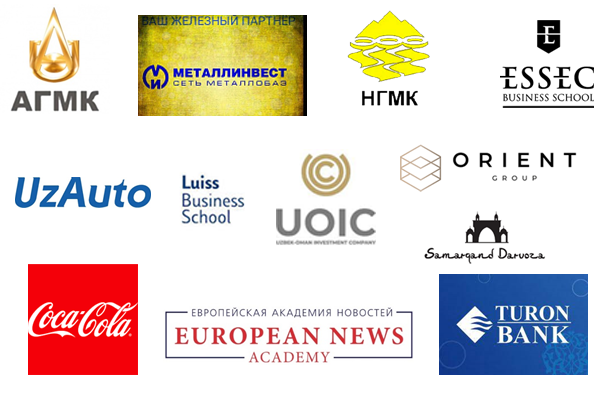
Our contacts
Phone: (+998 71) 267-39-50
Fax: (+998 71) 267-09-00
Email Mail: rektorat@uwed.uz
Address: 100007, Uzbekistan, Tashkent, Mustakillik avenue, 54.